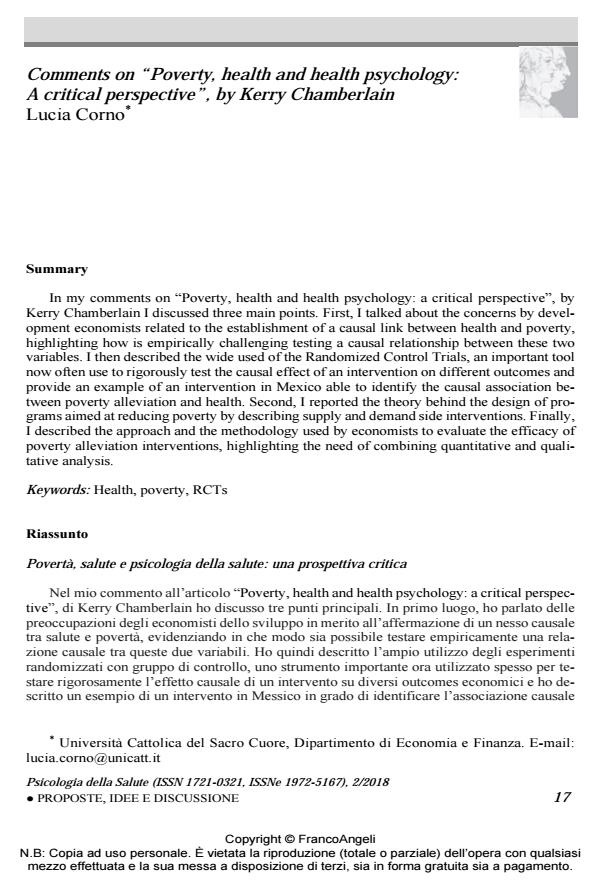Comments on "Poverty, health and health psychology: A critical perspective", by Kerry Chamberlain
Journal title PSICOLOGIA DELLA SALUTE
Author/s Lucia Corno
Publishing Year 2018 Issue 2018/2
Language Italian Pages 4 P. 17-20 File size 178 KB
DOI 10.3280/PDS2018-002004
DOI is like a bar code for intellectual property: to have more infomation
click here
Below, you can see the article first page
If you want to buy this article in PDF format, you can do it, following the instructions to buy download credits

FrancoAngeli is member of Publishers International Linking Association, Inc (PILA), a not-for-profit association which run the CrossRef service enabling links to and from online scholarly content.
In my comments on "Poverty, health and health psychology: a critical perspective", by Kerry Chamberlain I discussed three main points. First, I talked about the concerns by development economists related to the establishment of a causal link between health and poverty, highlighting how is empirically challenging testing a causal relationship between these two variables. I then described the wide used of the Randomized Control Trials, an important tool now often use to rigorously test the causal effect of an intervention on different outcomes and provide an example of an intervention in Mexico able to identify the causal association between poverty alleviation and health. Second, I reported the theory behind the design of programs aimed at reducing poverty by describing supply and demand side interventions. Finally, I described the approach and the methodology used by economists to evaluate the efficacy of poverty alleviation interventions, highlighting the need of combining quantitative and qualitative analysis.
Nel mio commento all’articolo "Poverty, health and health psychology: a critical perspective", di Kerry Chamberlain ho discusso tre punti principali. In primo luogo, ho parlato delle preoccupazioni degli economisti dello sviluppo in merito all’affermazione di un nesso causale tra salute e povertà, evidenziando in che modo sia possibile testare empiricamente una relazione causale tra queste due variabili. Ho quindi descritto l’ampio utilizzo degli esperimenti randomizzati con gruppo di controllo, uno strumento importante ora utilizzato spesso per testare rigorosamente l’effetto causale di un intervento su diversi outcomes economici e ho descritto un esempio di un intervento in Messico in grado di identificare l’associazione causale tra riduzione della povertà e salute. In secondo luogo, ho riportato la teoria alla base della progettazione di programmi volti a ridurre la povertà descrivendo gli interventi sia dal lato della domanda eche dal lato dell’offerta. Infine, ho descritto l’approccio e la metodologia utilizzata dagli economisti per valutare l’efficacia di interventi di sviluppo economico, evidenziando la necessità di combinare analisi quantitative e qualitative.
Keywords: Health, poverty, RCTs
Lucia Corno, Comments on "Poverty, health and health psychology: A critical perspective", by Kerry Chamberlain in "PSICOLOGIA DELLA SALUTE" 2/2018, pp 17-20, DOI: 10.3280/PDS2018-002004